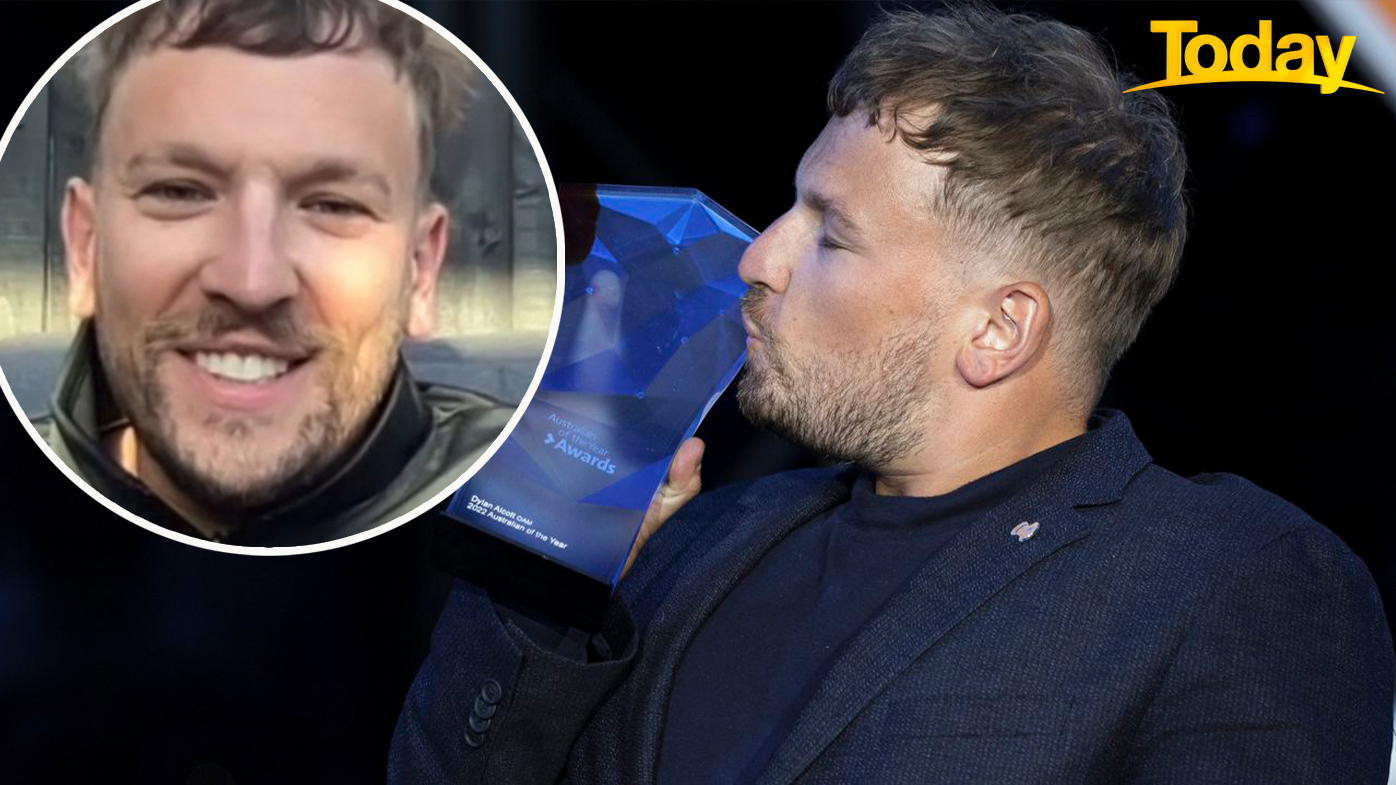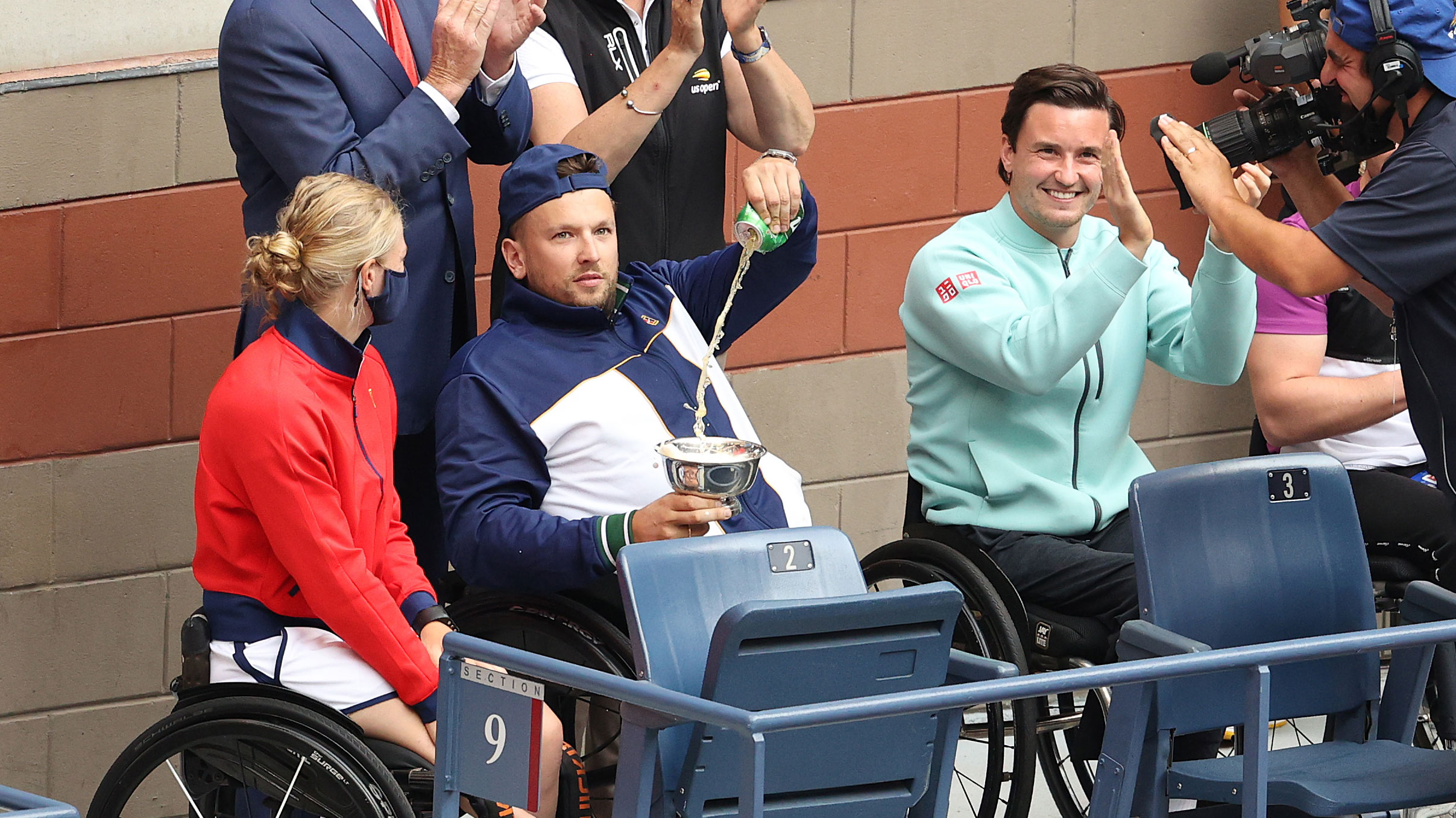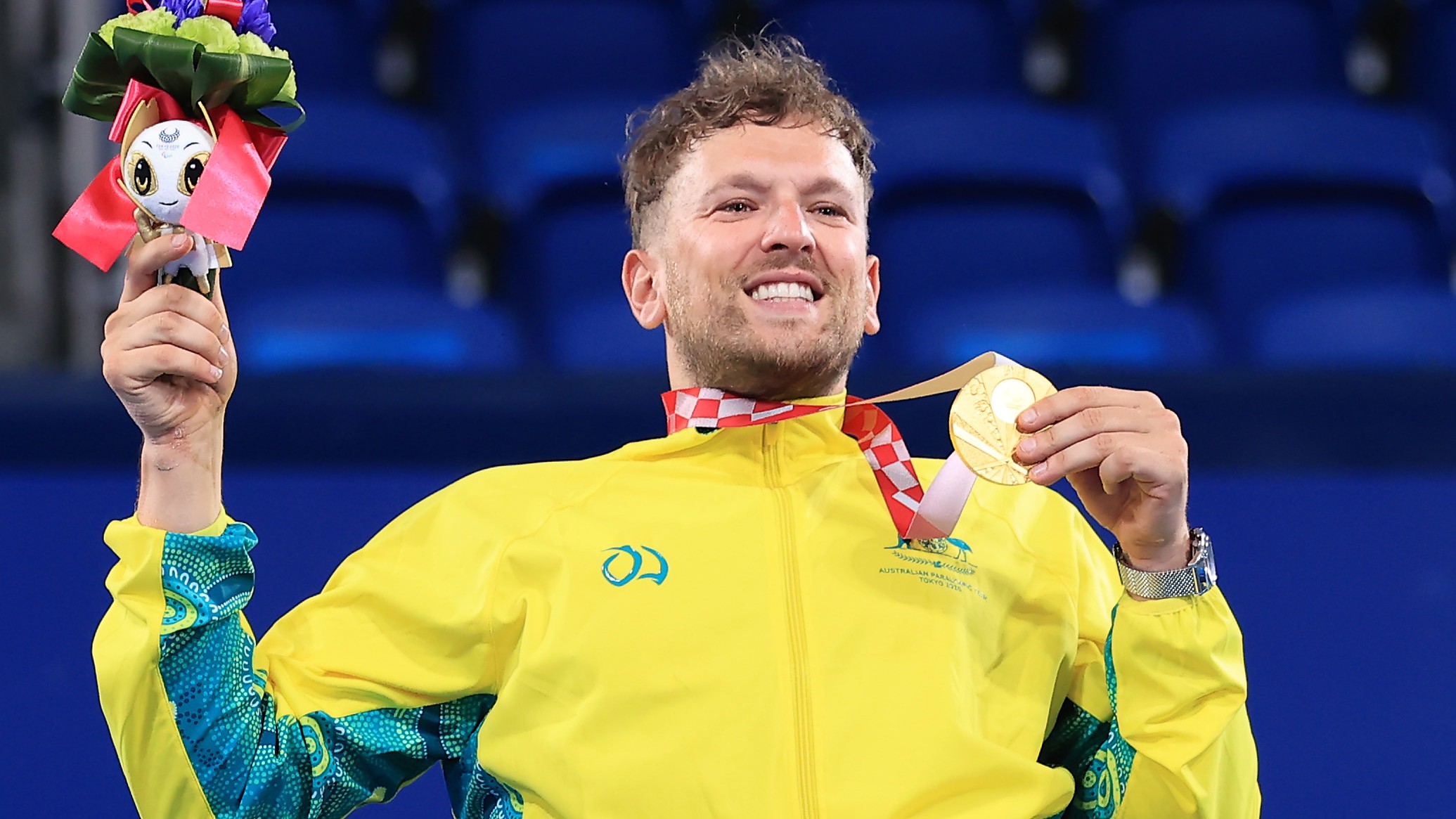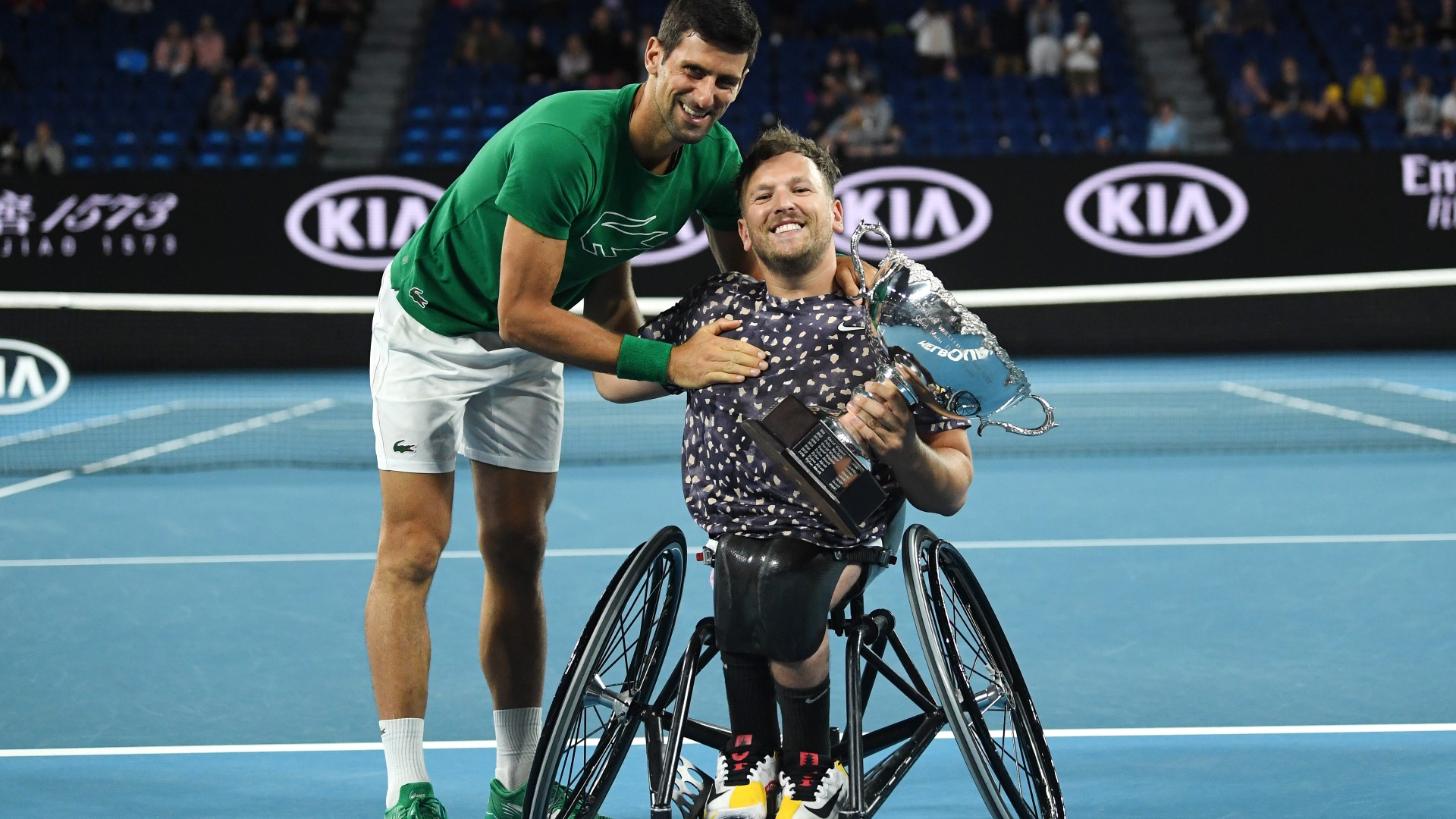Australian Dylan Alcott has done what no other male tennis player has ever achieved … he won the Golden Slam – the four majors and the Olympic gold medal in a calendar year.
Those trophies are part of a collection of accolades that have been bestowed upon him which also include a Logie when he was named favourite new talent on Australian TV. On top of all that he has an Order of Australia Medal and now the big daddy, Australian of the Year.
The 31-year-old who has represented Australia in basketball and tennis and was a swimmer is also a reluctant inspiration. He has overcome much adversity and prejudice to develop into a great athlete and all the while has worked to change perceptions of people with disabilities.
LIVE UPDATES: Kyrgios/Kokkinakis semi moved to Rod Laver
READ MORE: Ash Barty deflects Roger Federer comparisons
READ MORE: Rafael Nadal denies special treatment from officials
Alcott has achieved all there is to achieve in sport and not just in one sport and whether he wants to accept it or not, he is a role model not only for disabled people but also able-bodied people.
The 2022 Australian Open is his last event, and the final will be emotional for him. He feels the time has come to hang up the racquets and turn his attention to writing the next chapter of his life.
Craig Gabriel caught up with Dylan for a chat.
What makes Dylan Alcott tick, what motivates you, what generates your enthusiasm?
My motivation, the reason I get out of bed is to change perceptions so people with disabilities can get out and live the lives they deserve. People think winning gold medals and Grand Slams is my motivator and what gets me going, it’s not. I’m grateful for it because it gives me a platform to do what I am most passionate about which is living out that purpose. That’s why I get out of bed. The main reason is to be a good person, to be a good bloke and enjoy my life. I love life so much. I have been given a second chance to live.
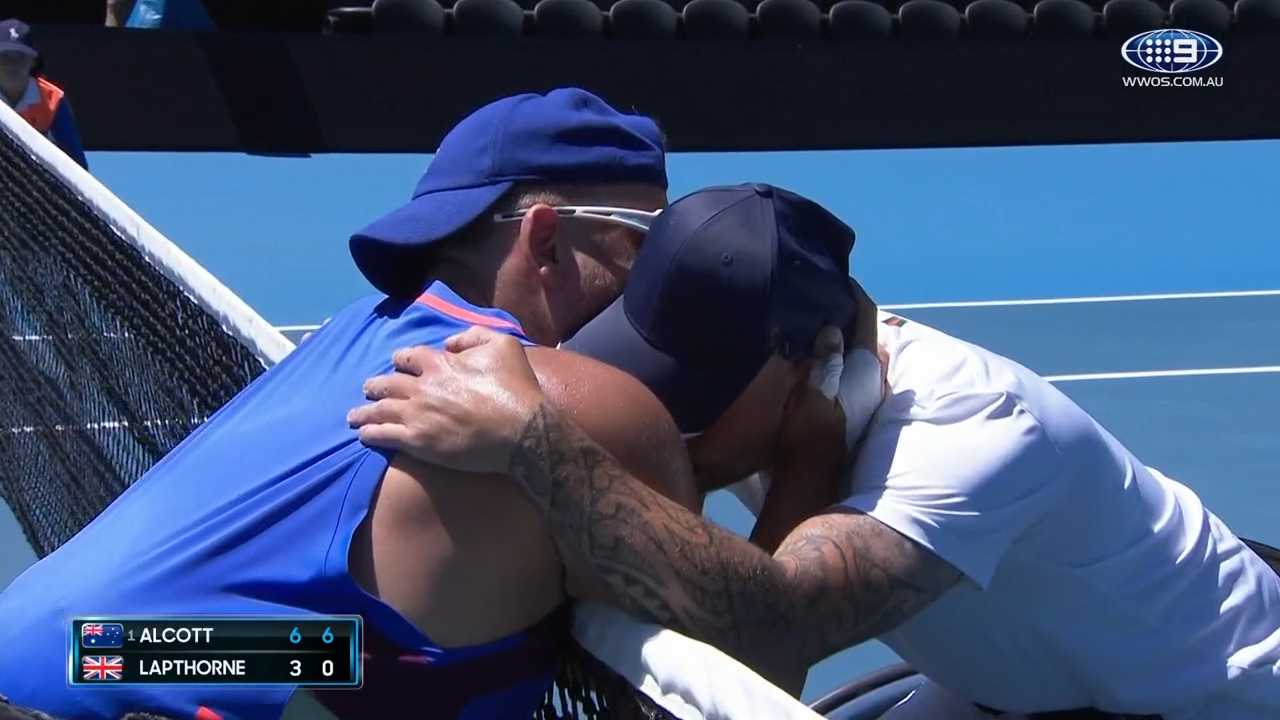
What do you want people with disabilities to take away from you?
I don’t want anybody with a disability to take anything away from me, but I want able bodied people to take something away from me, which is leaving their unconscious bias at the door and showing them what people with a disability can really do when given an opportunity. That’s my main goal but as a by-product of that, if people with a disability change their own perception of themselves, then that’s awesome as well. But my main thing is shattering those glass ceilings that people put on for people with disabilities.
Stream every match, every court of the Australian Open live and free on 9Now.
But don’t you also see yourself as an inspiration for people in a similar situation to you?
Not really. I don’t go out there to do that. I’m not going to tell people with a disability how to lead their life. They can live the life they want to live, but the reason they can’t live is because of a lack of opportunities, discrimination, access or whatever it is, so I try to change that and then I let people with disability be the people they want to be. It’s not my role to inspire them to be whatever but I’m sure I do that which is super humbling.
The beer drinking situation at the US Open, was it spur of the moment. Daniil Medvedev even looked up during the final and was smiling. Were you surprised by the reaction?
I had won the Golden Slam and I was asked (by the USTA) if my press conference could be delayed because they wanted to announce me to the crowd during the men’s final. I thought I’m going to scull a beer so I smuggled a beer in and I poured it into the trophy and sculled it because I don’t take myself too seriously. It was very nice – Medvedev looked up and smiled, Novak had a clap as well, Bradley Cooper was standing in front of me and Brad Pitt, they loved it as well and then it got 10 million views online.
Australian of the Year, what would it mean to be named Australian of the Year?
I don’t expect to be named Australian of the Year. I can’t even believe I was nominated. To have a person with a disability to be Australian of the Year is huge for the movement. I stand on the shoulders of giants, so many people with a disability who couldn’t have been Australian of the Year before me. Lost for words; humbled, and I’ll do my best to give that huge honour justice. I’ve had so much help and support and love. I’m the luckiest person in the world and the luckiest person with a disability. I will use that platform to shine a light and show society what a person with a disability can do when given the right opportunities to be themselves.

Logie Award, tennis trophies, where are they kept, what is more important for you?
I’m not a trophy guy or an award guy. I’m very grateful and humbled to win them but it’s not what motivates me. My mother has some, my father has some, my brother has some, but what do you reckon the No.1 trophy everyone loves, out of gold medals, Wimbledon, Australian Open etc, what do you reckon is the No.1 award people love picking up? The Logie. I have no idea why, but everyone loves the Logie. The Australian Open is my favourite tournament, it’s my hometown, it’s special but probably the one that means most to me are the gold medals. I sometimes can’t believe I managed to do it and very grateful for it. I don’t have a trophy cabinet, I never will, I’m not that kind of guy.
Where do you see your position in tennis and society generally?
I don’t think about it, I don’t even know. It doesn’t motivate; I just want to make a difference. If I change the life of someone in a very, very small way, then I have done what I was meant to do but what I will say I always wanted to get a platform to get change, I never thought it would happen. I never thought anyone would know my name, I never thought I would be on Rod Laver Arena, I never thought I would be on TV. I wanted it but never thought it would happen and I just can’t believe it’s happened. It’s sponsors and partners (like Babolat), it’s a juggernaut that we all play a role in. I play a very small role in.
Are you an emotional person and if so, how do those emotions manifest themselves?
Yeah, I’m an emotional guy. When people ask what’s your greatest strength, they think its bravery and resilience but for me it’s being authentic to be honest. You see me on the court, having a good time, sometimes laughing; I’m just being me. I’m enjoying it. Working my ass off is another one and the power of being vulnerable. I think being vulnerable is important because if you are vulnerable then you are emotional. It took me a long time to work on that because I used to hate myself, I hated being disabled, I used to be bullied about my disability. I didn’t want to be here anymore in any capacity let alone being a professional sports person. It took time but I’m proud of where I got to and that’s because of the support I have had over the years.

One more event to go with the Australian Open but what do you want to do now that you have called time on your tennis?
I’m never going to stop what I have been put here to do which is to keep living out that purpose and change people’s perceptions so people with disabilities can live the lives they want to live and however I do that I am not sure yet. I’ve got a foundation, I work in TV and radio, I’ve got a podcast, I’ve got a consulting firm called TSA where we educate people about disability. I’ve got a bunch of stuff. I want to do a bit of acting – I want to give it a crack; there are a lot of little ideas I want to do, and I’m excited about that, but I do love tennis and I will be sad that I’m going to be retiring. Tennis has been so good to me. I’m on a high right now and win, lose or draw at the Aussie Open, I’m just going to enjoy it for what it is, a beautiful celebration of tennis and it always is.
For a daily dose of the best of the breaking news and exclusive content from Wide World of Sports, subscribe to our newsletter by clicking here!

